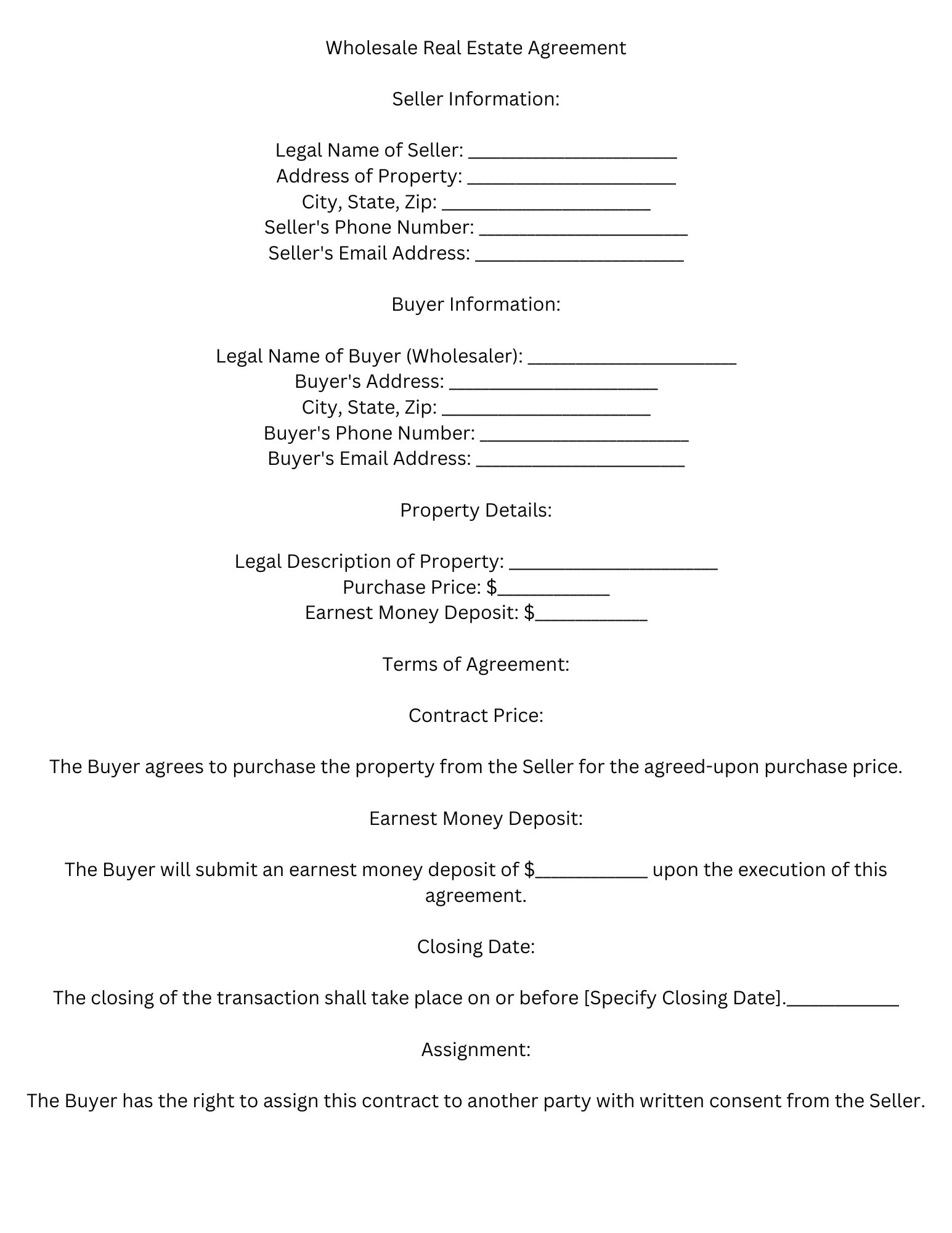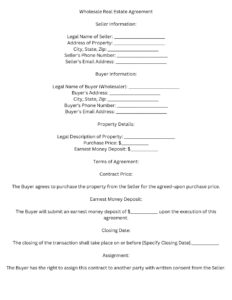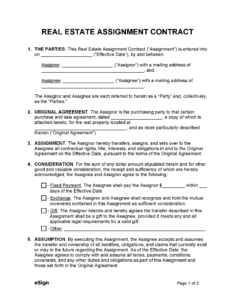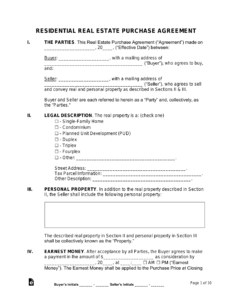Navigating the dynamic world of real estate wholesaling can be an incredibly rewarding venture, offering a unique path to property investment without the need for significant capital or long-term ownership. It hinges on the ability to identify distressed properties, secure them under contract, and then assign that contract to an end buyer for a profit. However, the seemingly simple concept requires a solid legal foundation to ensure all parties are protected and the transaction proceeds without a hitch.
This is where a robust wholesale real estate contract template becomes not just helpful, but absolutely essential. It serves as the blueprint for your deals, outlining the terms and conditions that bind the buyer and seller, and crucially, allowing for the assignment of your rights to a third party. Having a clear, comprehensive, and legally sound template streamlines your operations, mitigates risks, and builds confidence with both sellers and your network of cash buyers.

What Should a Robust Wholesale Real Estate Contract Template Include?
A well-drafted contract is the backbone of any successful real estate transaction, and in wholesaling, it takes on even greater significance. It’s not merely a formality but a critical tool that defines the scope of the agreement, protects all parties involved, and facilitates the smooth transfer of property rights. Understanding the key components is vital to ensuring your wholesale real estate contract template is effective and legally sound.
Parties Involved
First and foremost, the contract must clearly identify all parties involved in the transaction. This includes the full legal names of the seller(s) of the property and the buyer(s) or entity (the wholesaler). Accurate identification prevents misunderstandings and ensures that the agreement is legally binding on the correct individuals or companies.
Property Description
Accuracy here is paramount. The contract needs a precise legal description of the property, which can typically be found on the property deed or tax records. This includes the street address, city, state, zip code, and often the Assessor’s Parcel Number (APN). A detailed description eliminates any ambiguity about which property is being transacted.
Purchase Price and Terms
This section outlines the agreed-upon purchase price for the property. It should also specify how and when payment will be made, any earnest money deposit (EMD) required from the wholesaler, and the terms for forfeiture or return of the EMD. Clarity here prevents disputes over financial obligations.
Assignment Clause
Perhaps the most critical element for a wholesaler, the assignment clause explicitly grants the buyer (wholesaler) the right to assign their interest in the contract to a third party. Without this clause, the wholesaler might not be able to legally transfer their rights to an end buyer, undermining the entire wholesaling strategy. It should also detail any conditions or notification requirements for the assignment.
Contingencies and Due Diligence
Contingencies are conditions that must be met for the contract to become binding. Common real estate contingencies include inspection periods, title contingencies, and sometimes financing contingencies (though less common in cash wholesale deals). The contract should grant the wholesaler a specific period for due diligence, allowing them to thoroughly inspect the property, verify title, and assess its value and potential before committing fully.
Closing Date and Costs
The contract must specify a target closing date or a timeframe within which closing must occur. It should also clearly delineate who is responsible for various closing costs, such as title insurance, escrow fees, recording fees, and property taxes. This avoids last-minute surprises and ensures a smoother closing process.
Representations and Warranties
These are statements of fact made by the seller about the property, such as the absence of undisclosed defects or legal encumbrances. The buyer (wholesaler) may also make representations regarding their ability to perform. These clauses help protect both parties by clarifying assumed conditions of the property and transaction.
Default and Remedies
This section outlines what happens if either party fails to uphold their obligations under the contract. It specifies the remedies available to the non-defaulting party, which could include liquidated damages (e.g., forfeiture of the EMD) or the right to pursue specific performance.
Other important clauses to consider including are:
- Earnest Money Deposit amount and terms
- Inspection period length and buyer’s rights during this period
- “As-Is” clause, indicating the buyer accepts the property in its current condition
- Lead-based paint disclosure (for properties built before 1978)
- Prorations for property taxes, utilities, and HOA fees
- Possession date of the property
- Governing law (which state’s laws will apply)
Customizing Your Wholesale Real Estate Contract Template for Success
While a well-designed wholesale real estate contract template provides an excellent starting point, recognizing that no two real estate deals are exactly alike is crucial for long-term success. The power of a template lies in its adaptability, allowing you to tailor it to the specific nuances of each transaction, local regulations, and the unique circumstances of both the seller and the end buyer.
The first step in customization should always involve seeking professional legal advice. Real estate laws vary significantly from state to state, and even county to county. What is standard practice in one area might be illegal or unenforceable in another. A local real estate attorney can review your template, suggest necessary modifications to ensure compliance with local statutes, and help you understand potential legal pitfalls. Investing in this legal consultation upfront can save you considerable time, money, and stress down the line.
Furthermore, a template needs to be flexible enough to accommodate negotiation. During the process of securing a property, sellers might have specific requests or conditions, such as a longer closing period or the ability to leave certain items behind. Your template should be designed to easily incorporate these agreed-upon terms without compromising the core integrity of the contract. Being able to quickly and accurately adjust your documents shows professionalism and can help you close more deals.
Finally, remember that certain disclosures and addendums might be legally required depending on the property type or location. For instance, properties built before 1978 will typically require a lead-based paint disclosure. Properties in flood zones might require specific flood hazard disclosures. Ensuring your wholesale real estate contract template either includes these or has provisions for attaching them makes your agreement comprehensive and fully compliant, safeguarding your business against future legal challenges.
Utilizing a meticulously prepared and appropriately customized contract is a cornerstone of a successful wholesaling career. It not only provides a clear roadmap for each transaction but also offers a layer of protection for your interests and those of the parties you work with. By understanding its components and adapting it wisely, you equip yourself with the confidence to navigate the complexities of the market, build strong professional relationships, and effectively scale your real estate investment endeavors. This diligent approach to documentation underpins every profitable assignment fee and helps build a reputation as a trustworthy and competent real estate professional.



